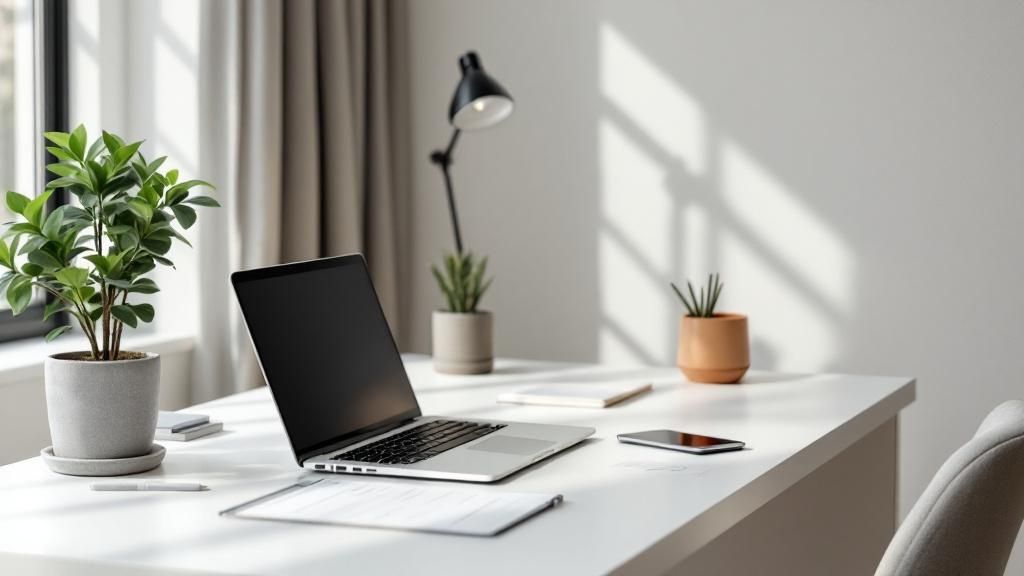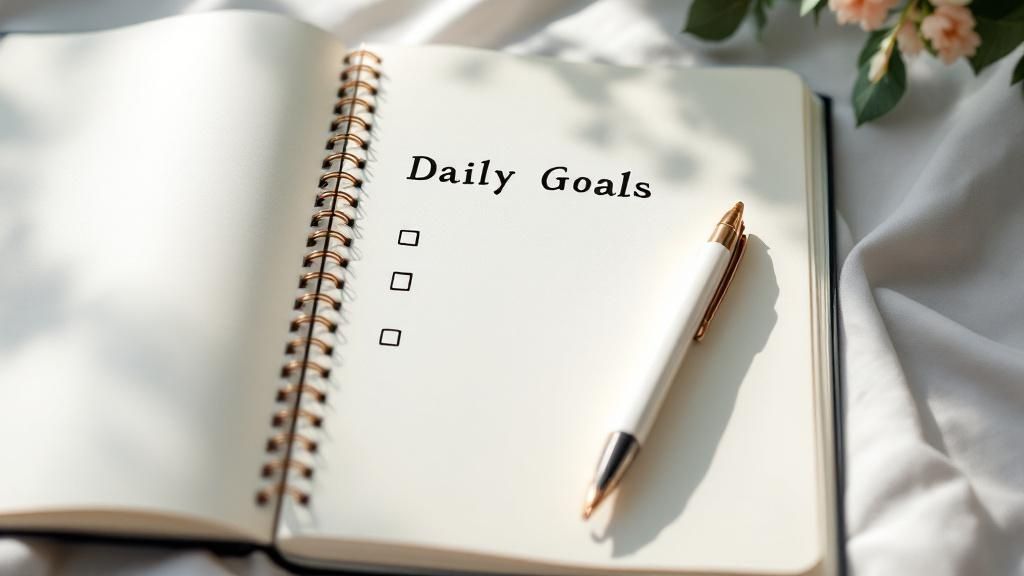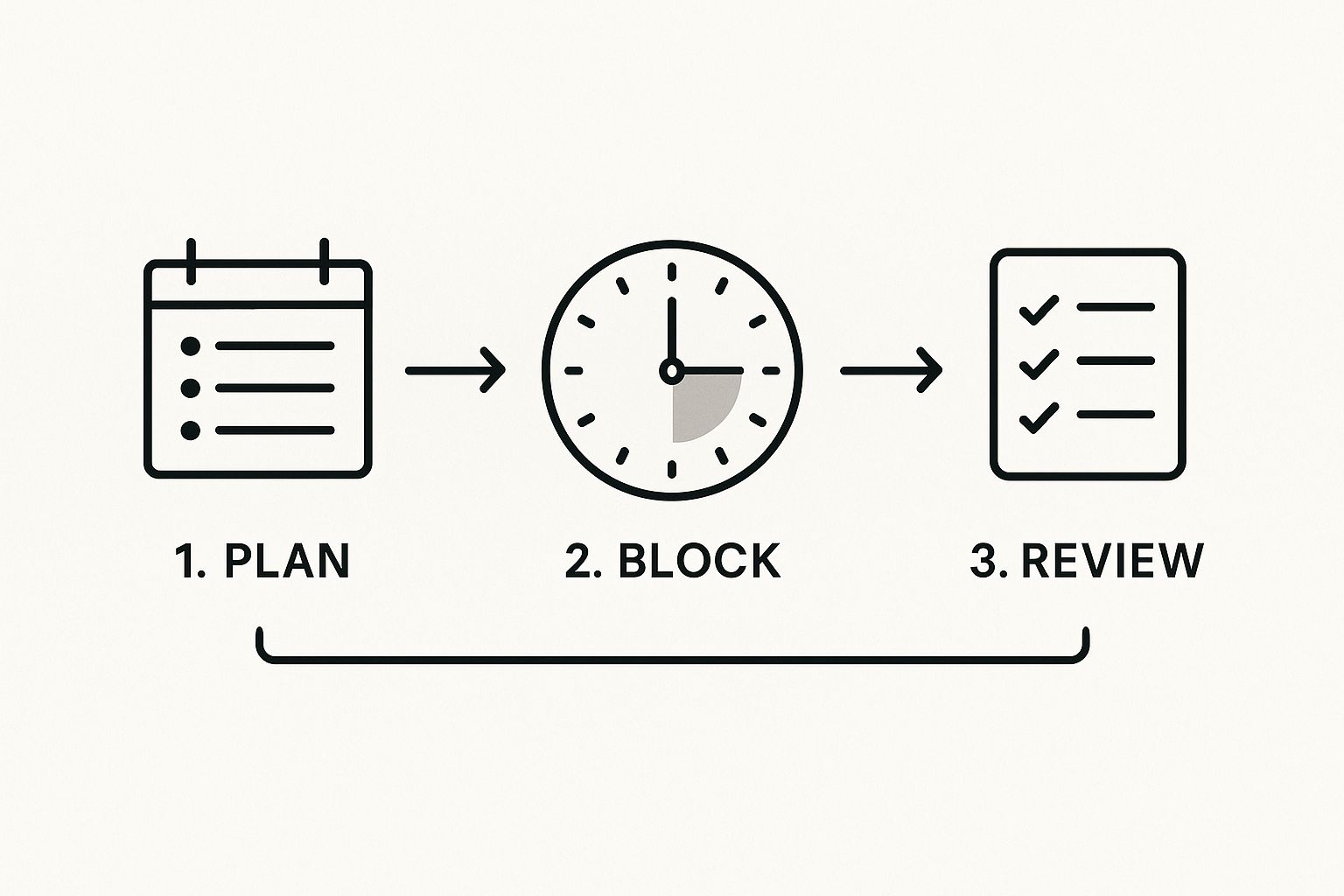
How to Focus Better and Reclaim Your Attention
If you feel like your ability to concentrate is constantly under attack, you're not wrong. But learning how to focus better isn't about gritting your teeth and trying harder—that's a losing battle. The real key is to stop relying on willpower and start building systems that make deep work the natural, easy choice.
It’s all about strategically redesigning your environment, habits, and mindset to sideline distractions before they even have a chance.
Winning the Battle for Your Attention

In a world practically engineered for distraction, your ability to focus has become a genuine competitive advantage. True concentration goes way beyond just "trying harder." It's about intentionally shaping your life to support sustained, deep work.
This guide is designed to give you practical, no-nonsense techniques to reclaim your attention. We'll get into the nitty-gritty of creating an environment that actually helps you be productive, tackling both the physical clutter on your desk and the digital noise constantly vying for your attention. You'll learn how to turn your workspace into a true "focus zone."
Focus isn't some talent you're born with; it's a skill you cultivate through daily practice. When you start implementing proven habits and routines, you're essentially training your brain for longer and longer periods of concentration. What feels like a struggle now can become a sustainable, almost automatic practice.
To get there, we're going to break it all down. Before we dive into the specific tactics, let's look at the foundational pillars that support unbreakable focus.
The Pillars of Unbreakable Focus
Here’s a quick overview of the core strategies this guide will cover to help you regain control over your attention.
| Pillar | Core Action | Primary Benefit |
|---|---|---|
| Environmental Design | Proactively shaping your physical and digital spaces. | Reduces interruptions and makes focus the path of least resistance. |
| Habit Formation | Integrating simple routines like time blocking and single-tasking. | Builds mental endurance and makes deep work a default behavior. |
| Mindset & Well-being | Adopting mindfulness and managing your body's energy. | Manages internal distractions and prevents burnout. |
Each of these pillars works together to create a powerful, holistic system for concentration. They're not just isolated tips; they're interconnected parts of a larger strategy. For more ideas on setting up a productive workspace, check out our advice on how to stay healthy in the modern office.
Engineer Your Environment for Deep Work

Your ability to focus is directly tied to the environment you're in. Let's be honest, your surroundings are either helping you concentrate or they're actively working against you, making every task feel like an uphill battle. The first and most impactful change you can make is to carve out a dedicated 'focus zone'.
This doesn't mean you need a separate home office with a door. It could be a specific corner of your kitchen table or even a particular armchair. The magic here is in the psychological association; when you're in that spot, your brain gets the signal that it's time for serious, deep work. This simple habit conditions your mind to slip into a state of concentration much more easily.
A calm, organized space can do wonders for your cognitive functions. There’s a strong link between decluttering for mental health and boosting focus, and it’s worth exploring if you want to create a truly optimal work environment.
Tame Your Digital World
Your digital environment is just as critical—if not more so—than your physical one. That constant barrage of pings, pop-ups, and notifications is one of the biggest culprits behind shattered focus. Taking back control requires a proactive, not reactive, approach.
First, declutter your digital desktop. A screen packed with dozens of icons is just visual noise, creating a subtle but constant sense of being overwhelmed. Tidy up your files into folders and keep only the absolute essentials on your main screen.
Next, you need to get ruthless with your notifications.
- Kill non-essential alerts on both your phone and computer. Do you really need a pop-up for every email or social media "like"? Probably not.
- Use 'Do Not Disturb' or 'Focus Mode' whenever you're doing dedicated work. Schedule specific times to check messages instead of letting them derail your flow.
- Physically move your phone to another room. I mean it. Research shows the mere presence of your smartphone can reduce your available cognitive capacity, even when it’s turned off.
It's not just a personal productivity hack; companies are catching on. According to CBRE’s Global Workplace & Occupancy Insights, employee satisfaction has shot up by 75% in rankings over the past year. This is largely because businesses are finally investing in flexible, productive environments with quiet zones and supportive tech. You can dig into more of these insights in the 2024 workplace report.
Build Habits That Sharpen Your Concentration
Deep, sustained focus isn't some innate talent people are born with. It's a skill. And like any skill, it's cultivated through daily practice. While setting up your environment is a great first step to remove distractions, the real, long-term gains come from building habits that train your brain to concentrate for longer stretches. It's about creating solid routines you can depend on, not just waiting for motivation to strike.
The first step? Drop the myth of multitasking. What you think is multitasking is actually "task-switching"—your brain rapidly bouncing between different jobs. It’s incredibly inefficient and drains your mental battery, leaving you feeling busy but not truly productive. Instead, commit to single-tasking. Pour all your cognitive energy into one thing at a time. This simple shift is the foundation for learning how to truly focus.
Master Your Schedule with Time Blocking
One of the best ways I’ve found to enforce single-tasking is with time blocking. This goes way beyond a simple to-do list. It's a strategy where you carve out and assign specific blocks of time in your calendar for specific tasks. So, instead of a vague goal like "work on report," you schedule 9:00 AM to 10:30 AM for "Drafting the Q3 report introduction."
This simple act of planning and scheduling creates a powerful framework for getting into deep work.

When you proactively give every minute of your workday a job, there's no room left for indecision or distraction to sneak in.
Time blocking works because it forces you to get real about how you spend your hours. You're making a proactive declaration of your priorities, turning your calendar into a fortress that defends your most important work from interruptions.
Use Strategic Breaks to Recharge
Think of your concentration like a muscle—it gets tired if you overuse it. Trying to power through for hours on end is just a fast track to burnout and sloppy work. The Pomodoro Technique is brilliant because it works with this reality, structuring your work into focused bursts—usually 25 minutes—followed by short 5-minute breaks. After four of these cycles, you take a longer break of 15-30 minutes.
These breaks aren't for doom-scrolling social media, though. They’re for genuine mental recovery.
- Get up and stretch. It gets the blood flowing and eases any physical tension from sitting.
- Look out a window. Give your eyes a rest from staring at the screen.
- Grab a glass of water. Staying hydrated is absolutely crucial for good cognitive function.
These little recovery periods stop mental exhaustion in its tracks and keep you sharp for the next sprint. For those long days at the desk, learning how to reduce eye strain from computer use is another game-changing habit. Interestingly, many strategies developed for managing ADHD can also be incredibly helpful for anyone looking to focus better. For some practical ideas, check out these effective ADHD focus tips to boost concentration. By working these habits into your routine, you’ll build mental endurance that lasts.
The Hidden Connection Between Light and Focus
The light in your room does more than just help you see. It’s constantly sending powerful signals to your brain, telling it when to be alert and when to power down. Think about it: our bodies evolved to work with the sun—bright light during the day meant energy and focus, while darkness at night signaled rest.
But our modern world, with its endless screens and artificial lighting, has thrown a wrench in that finely tuned system.
This constant bath of light, especially the intense blue light blasting from our phones, laptops, and tablets, essentially tricks our brains into a state of perpetual daytime. This messes with your circadian rhythm, the internal 24-hour clock that tells you when to sleep and when to wake up. The fallout? It’s often digital eye strain, that feeling of mental fog, and a real dip in your ability to stay sharp.
How Blue Light Blocking Glasses Can Help
So, how do we fight back? One of the most effective tools I've found is a good pair of blue light blocking glasses. These aren't just a gimmick; they're a practical way to reclaim your focus if you spend hours staring at a screen. By filtering out the most aggressive wavelengths of light, they give your eyes—and your brain—a much-needed break from the overstimulation.
When you're shopping for a pair, you'll generally run into two types of lenses:
- Daytime Lenses: These usually look clear or have a faint yellow tint. They’re designed to filter a specific portion of the blue light spectrum, which is perfect for cutting down on eye strain and headaches without making your screen look weird. They’re ideal for wearing at your desk all day.
- Nighttime Lenses: You can't miss these—they have a much darker, amber or red tint. Their job is much more serious: to block almost all blue and green light. This sends a clear signal to your brain that it's nighttime, allowing it to start producing melatonin and prepare for sleep. I recommend putting these on an hour or two before you plan to go to bed.
By managing your light exposure with a bit of strategy, you're not just helping your eyes. You're protecting your sleep, which is the absolute foundation for strong cognitive function. Better sleep tonight means better attention, memory, and mental clarity tomorrow.
If you want to go deeper into the science behind all this, there are tons of blue light studies and information that break down the effects in detail. It's a simple habit, but one that can make a surprisingly big impact on your daily productivity.
Adopt a Mindset for Sustained Attention

Your physical workspace is only half the battle. Your internal world—your mindset—is just as crucial for deep concentration. Truly learning how to focus better involves a few powerful mental shifts that help you slice through mental clutter and build resilience against the distractions that will inevitably pop up.
It all starts with accepting a simple truth: our minds are built to wander. The goal isn't to force your brain into a state of perfect emptiness. It's about getting better at noticing when your attention has drifted. This is where simple mindfulness practices become a kind of superpower for your focus. You don't need to meditate for an hour. Just taking a few moments for some controlled breathing can train your brain to recognize when it's off-track and gently guide it back.
Set Your Intention Before You Start
Before you dive into a demanding task, take just 30 seconds to set a clear intention. It's a simple but powerful trick. Ask yourself: "What does success look like for this specific work session?" This small act primes your brain for the work ahead, giving you a clear target to aim for and making it much easier to return to after an interruption.
This isn't about rigid perfectionism. It's about self-compassion. When you get distracted (and you will), avoid that frustrating downward spiral. Instead, just acknowledge the distraction without judgment and calmly redirect your attention. This simple habit can prevent a minor interruption from completely derailing your day.
Another game-changing shift is to treat focus as a project, not a task. A task is about completion, like firing off one email. A project is about contribution and sustained effort, like building a strong client relationship. This perspective encourages you to invest your full, undivided attention.
Fuel Your Brain for Peak Performance
Your mindset is deeply connected to your physical well-being. A tired or poorly nourished brain simply can't maintain high levels of focus for long. This is where the bigger picture of life-work balance comes into play, because your mental energy is a finite resource.
Data from the Global Life-Work Balance Index shows that policies supporting employee recharge time—like shorter workweeks—are directly tied to a less distracted, more attentive workforce. It's no surprise that countries with high happiness scores and lower work hours also report better focus in the workplace, proving the essential need for mental rest.
And of course, what you eat matters. A well-fed brain is the foundation for sustained attention. You can explore more about nutrition for brain health to give your cognitive performance the support it needs.
Got Questions About Improving Focus?
When you're trying to sharpen your focus, it's normal to hit a few roadblocks. Let's tackle some of the most common questions that pop up when people start trying to build this skill. Getting these answers sorted can make a huge difference.
How Long Does It Take to Actually Improve My Focus?
You can feel a difference almost immediately. Seriously. Simple tweaks like silencing your phone or clearing your desk can bring an instant sense of relief and clarity.
But building those deep, lasting focus habits—the kind where you can truly lose yourself in your work—takes a bit more time. Things like mastering time blocking or weaving mindfulness into your day are a gradual process. Most people I've talked to say they notice a real, significant shift after a few weeks of consistent effort.
The goal here is progress, not perfection. Don't burn yourself out trying to do everything at once. Just pick one or two strategies that feel right for you, practice them until they're second nature, and then build from there.
What if My Job Forces Me to Multitask?
I hear this one all the time. Many jobs feel like a constant juggling act, but here's the thing: true multitasking is a myth. What your brain is actually doing is switching back and forth between tasks, and that constant context-switching is incredibly draining. It eats up your mental energy.
Instead of fighting to do everything at once, give "task batching" a try.
- Group similar activities. For example, block out a specific time just to power through all your emails.
- Set aside another chunk of time only for making phone calls.
- Carve out and protect a separate, sacred time for deep work on that one big project.
By batching your tasks, you stop forcing your brain to shift gears so often. You stay in a similar cognitive mode for longer, which conserves energy and makes you far more effective.
Can Diet and Exercise Really Make a Difference?
Absolutely. It's not just fluff. Think of your brain as a high-performance engine—it needs the right fuel and regular maintenance to run at its best.
Getting your body moving is one of the most powerful things you can do for your concentration. Exercise boosts blood flow to the brain and helps release critical neurotransmitters like dopamine and norepinephrine, which are essential for attention. Even a brisk 20-minute walk can clear the cobwebs and sharpen your mind.
The same goes for what you eat. A balanced diet that gives you a steady stream of energy helps you avoid that mental fog from blood sugar spikes and crashes. And don't underestimate hydration! Even being mildly dehydrated can seriously tank your ability to concentrate.
At Spektrum Glasses, we know that managing your environment is a huge piece of the focus puzzle. Our stylish, science-backed blue light blocking glasses are designed to cut down on digital eye strain and help you get the restorative sleep your brain needs for peak performance. Protect your focus and shop our collection today.
